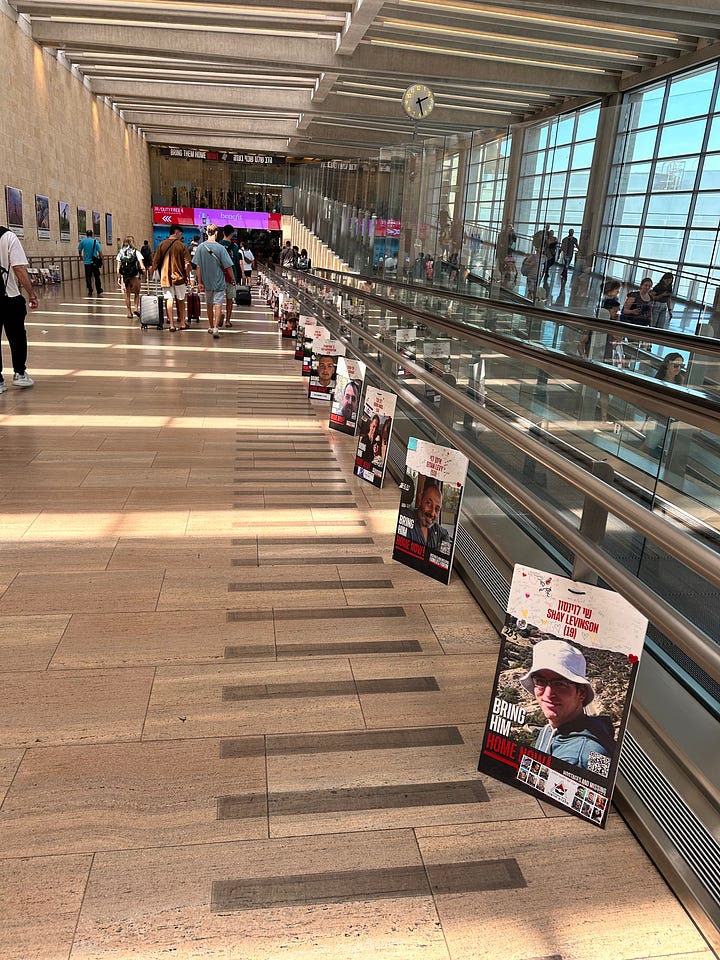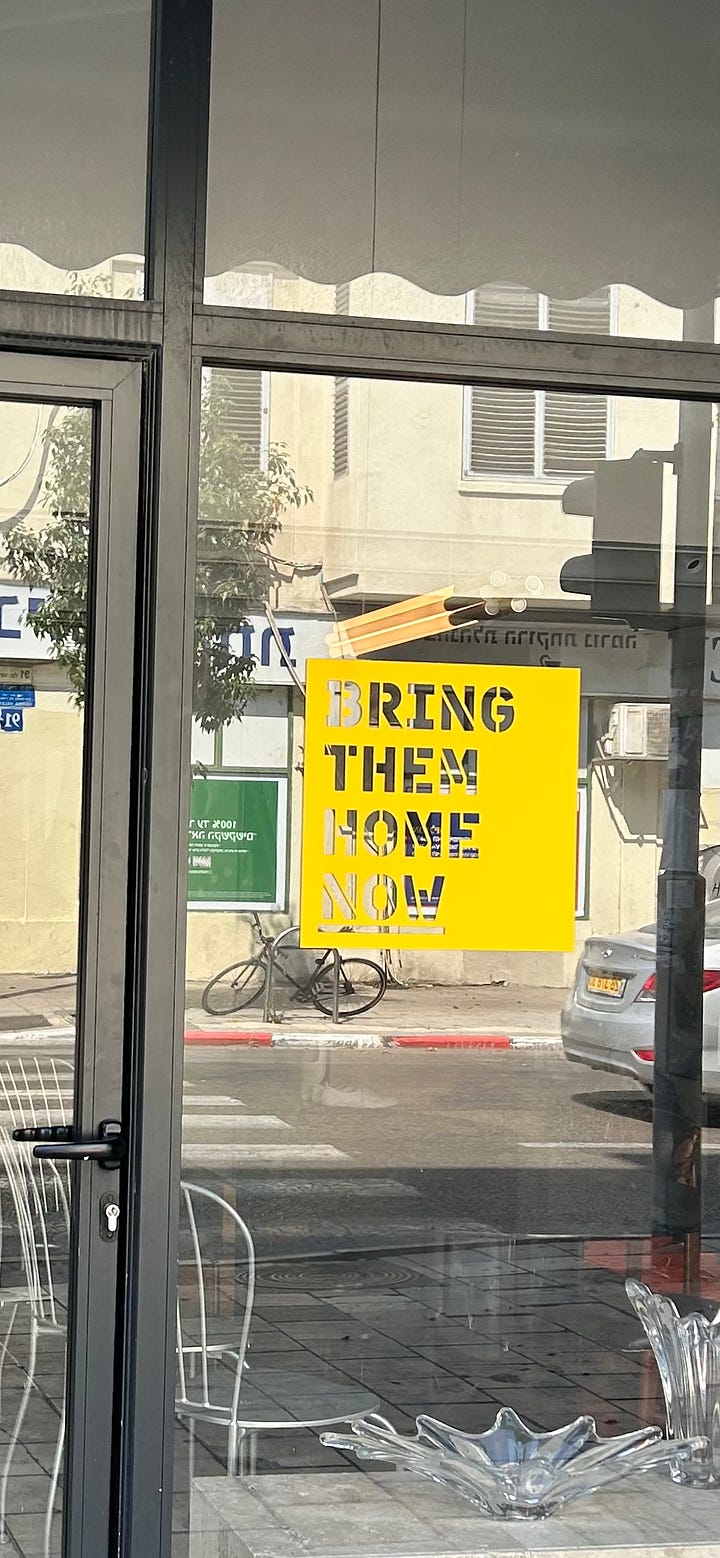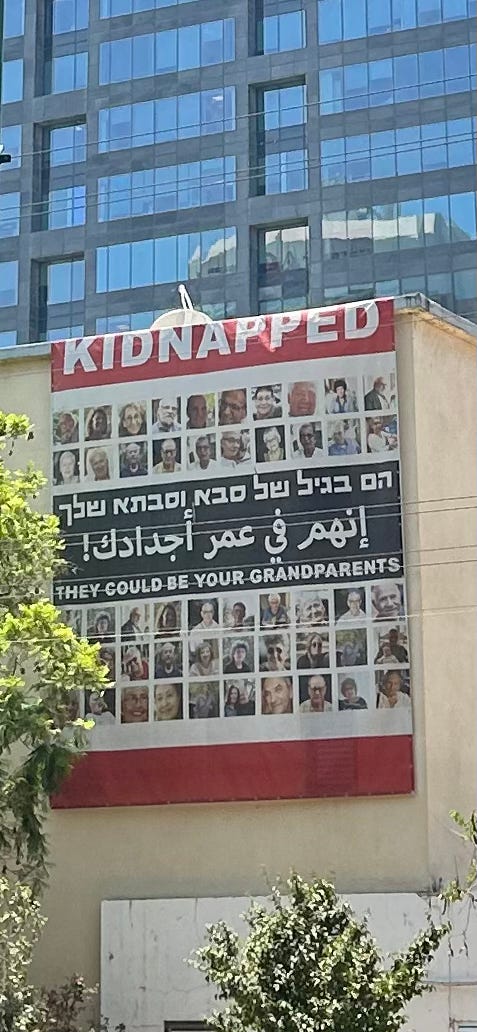I went to Israel for the first time in my life, to interview people for a piece I’m writing for the FT Magazine. I’m glad I went - but I’m also happy to be back.
When I go to report print pieces abroad, I go on my own. In an age of Apple Pay, Google Translate, Google Maps and Uber, it’s easy to believe you can be self-sufficient pretty much anywhere in the world where those apps work. But Israel isn’t anywhere. There was a drone strike on Tel Aviv the night before I landed there; someone was killed a few streets away from my hotel. Of course, it’s so much safer to be on the Israeli side of the battle lines in this war. But it’s still far from safe.
Anyway. I’m glad I went because (a) I got to work on a story so fascinating that for the first time in my life I haven’t loathed every second of transcribing the interviews and (b) I got to see some of the humanity of the Israeli people, and the diversity of opinion that exists among them - two things which tend to be absent from much of the international reporting of the conflict.
Before you collect your bags at airport baggage reclaim - even before your passport is checked - you are confronted by individual images of the Israeli hostages cable tied to railings. Every shop has a Bring Them Home Now poster in its window. On every street, there are huge murals urging people not to forget those who have been kidnapped.




And everyone I met knew someone who had been killed, kidnapped or brutalised on October 7th. The collective trauma is palpable. While the rest of the world has moved on from the atrocity of what happened that day, focusing instead on the atrocities being perpetrated today in Gaza, the people of Israel cannot move on. For them, October 7th is ever-present. Perhaps it will never be in the past - even if and when the hostages are ever home.
Amid the horrors of the Israeli onslaught on Gaza, we need to be willing to recognise the humanity of people in Israel. Throughout history, it’s become accepted that the humanity of Jews can be denied, ignored. This is dark. Some Israelis yearn for peace in Gaza; others want it razed to the ground. Some are openly islamophobic; others see no difference between themselves and the Palestinians. In other words, Israeli society is as diverse as any other. Maybe more so: I wasn’t expecting to see faces from all over the world during my visit. Even among Israeli Jews, there is incredible diversity: Polish Jews, Ethiopian Jews, Yemeni Jews, Orthodox, atheist, you name it.
While I was there, I realised my own ambivalence to Israel - and being Jewish - comes from a place of great privilege. Growing up in a city as tolerant as London, with no family members that endured the Holocaust, I have always lived with the luxury of never really having to consider my Jewishness very much. But over the last year, I’ve been confronted with it, through the bonkers anti-semitic comments I’ve begun receiving since October 7th. Other people see my Jewishness before they see anything else about me, whether or not I see it myself.
While I was away, the Sunday Times Magazine published this piece I wrote about the rise of early onset cancer among people in their 20s, 30s and 40s, and what it’s like to try and get jobs and find love when your future is so uncertain.
Maybe I was naive not to anticipate this, but within a day or so, my Twitter mentions and inbox were filled with messages from people asking me to explain why I hadn’t mentioned that the Covid vaccine was to blame. As I say in the piece, the number of under-50s diagnosed with cancer in the UK increased by 24 per cent between 1995 and 2019. Before there was Covid, let alone a vaccine.
My tweet pointing this out was not enough for some people. “We both know why you wrote this article,” one responded using the form on my website. “Where did they recruit you?”
I might have found this funny once, but not any more. In a week when the people of Southport have been brutalised twice - once by a knife-wielding maniac, and then again by right-wing online sleuths convinced the maniac is a Muslim who came to the UK on a dinghy - I am not laughing. Conspiracy theorists are thoroughly depressing.
Things that have caught my eyes and ears:
Had a whale of a time on stage at Camp Bestival, but my kids much preferred watching a man dressed in a unitard, cowboy hat and nipple rings, who mimed to songs from Moana while playing air guitar on a shovel. Ah, festivals. Ah, parenthood.
Am very much enjoying Escape from The Maze, the inside story of the biggest jail break in British and Irish history (made by Conor Garrett, the fabulous producer behind The Gift)
Loved the Simone Biles Netflix doc, but mainly because I could watch her anywhere, indefinitely
Have been watching her and everyone else at the Olympics, and remembering being four and convinced I would grow up to be the female Sebastian Coe





I always enjoy reading your Little Red Notebook.
I particularly enjoyed the brief description of what it is like in Israel at the moment. I am afraid the horror of 7/10 has got lost in the devastating assault on the people of Gaza, the tragedy of Ukraine and worries about the rise of the extreme right across Europe.
The conspiracy "theorists" are clearly bonkers!
Enjoying these Jenny - I've been following you, reading and listening to your work etc for ages but it had never occurred to me until today that you are Jewish.... which I suspect and hope that most people (including I dare say yourself) would say is exactly how it should be!